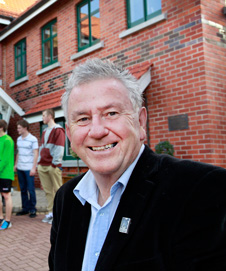After 18 “extraordinary” years as Warden of various University Colleges, Ashley Day yesterday finished his time heading up University-owned student accommodation.
He has been warden of Aquinas College, University College and most recently Carrington College, and in that time has been responsible for much positive change.
The Otago Bulletin Board spoke to him as he prepared to step out of this life and into retirement.

Ashley Day, who retired as Warden of Carrington College yesterday. Photo: Sharron Bennett.
As we begin our interview one of the cleaning staff of Carrington knocks on the door of Ashley Day's office to say goodbye.
The pair hug; the farewell is genuine. It is an insight into both the breadth of the role of Warden in a University college, and the esteem in which Mr Day is held.
In 1995 Mr Day began his role as Warden of Aquinas College (then known as Dalmore House).
It was one of the University's smaller colleges, at that time home to 140 students. He spent two years there, essentially “cutting his teeth” on the varied role that is Warden. He liked the college, but, he says, did not like its name.
“It had been known previously as Aquinas, and it was known throughout the country by that name. So I began the process to change it back.”
In 1996 Dalmore became once more known as Aquinas.
In 1997 the position of Warden at University College became available, and Mr Day leapt at the chance to head the University's largest college. But in the late 1990s University Colleges were very different to what they are today.
"Our Colleges are now outstanding compared to others around the country."
“Unicol was quite a boisterous place,” Mr Day says. “It was a bit of a baptism of fire for me.”
There were no Deputy Wardens at University Colleges, and the Assistant Wardens were senior students. If the Warden had to be away overnight, the College was left in the hands of students. Unsurprisingly perhaps, trouble did occur.
“It was hard work for a few years,” Mr Day says. “Unicol was the first college to have a Deputy Warden live in. We got night staff and security on the doors. It became a very good place to live.”
The University's other colleges followed suit – and the improvements were vast.
Another significant change was that the University began to see the colleges as “the jewels in its crown”.
Unlike other universities around the country which sold many of their hostels to private enterprise, Otago, under then Vice-Chancellor Professor Sir David Skegg, embraced them as part of the University system. Professor Skegg favoured the “Oxbridge” model of University accommodation, changing them from “Halls of Residence” to “Residential Colleges”. Alongside this, Otago's Colleges put great emphasis on pastoral care, tutorial systems, and health support.
“Our Colleges are now outstanding compared to others around the country,” Mr Day says.
The developments at Unicol during Mr Day's tenure were physical as well as practical. During his time at Unicol a new wing was built, increasing the capacity of the already large College from 350 students to over 500. In addition, he says he has always believed that the nicer an environment, the more people will respect it. He replaced linoleum floors with carpet and brought in rugs and original art works so that Unicol became more of a “home” and less of an “institution”.
Even with the improvements, heading Unicol remained a “full-on” job.
“It was 24/7,” Mr Day says. “For years I got up at 1am and walked the halls. After 10 years I needed a change.”
So, six years ago, when the position of Warden at Carrington came up, Mr Day made the move to the smaller college which accommodated 244 students.
At Carrington he instigated a “parents' orientation” where parents are able to join their children for two days at the beginning of the year and live in."At the beginning of the year they are essentially seventh formers just out of home. By the end of their time they are adults ready for the world. The change is extraordinary."
“They spend two nights here and get a feel for College and University life. When they return home they feel much more comfortable leaving their children, because they know they will be well looked after.”
Again, other colleges have followed Mr Day's lead, with varying degrees of success.
Eighteen years as college Warden have been both the hardest and best years of Mr Day's working life. And at his side has been his wife Lesley, who Mr Day says has always been completely supportive.
“She has always been very interested in the Colleges, and has helped me keep perspective and understand everything better.”
He says the job has been an “absolute privilege”.
“As Warden you live so intimately with a group of young people at a defining time in their lives, and you are therefore able to effect some changes for the good in their behaviour. At the beginning of the year they are essentially seventh formers just out of home. By the end of their time they are adults ready for the world. The change is extraordinary.”
Mr Day is looking forward to his retirement, which will allow time for his many interests, as well as more time with his wife, two daughters and four grandchildren.
When Mrs Day retires at the end of next year, the pair will divide their time between Dunedin and Clyde.
Mr Day will be replaced as Warden of Carrington by Peter Walker, currently Warden of Cumberland College.